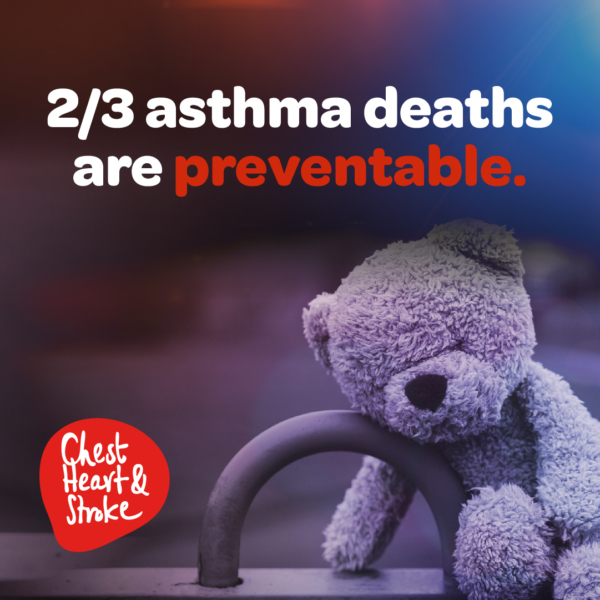
No parent of a child with asthma wants to think about the possibility of their child suffering a fatal asthma attack.
However, the reality is that every 10 seconds in the UK, someone has a potentially life-threatening asthma attack.
YOU can help prevent your child from having a dangerous asthma attack.
Make sure your child uses their preventer inhaler every day and carries their reliever inhaler everywhere.
- Check your child is using the proper technique to take their inhalers.
- Know what to do in the event of an asthma attack.
Keep reading to find out more about how you can put these steps into action to help prevent an asthma attack.

Using inhalers correctly
Did you know only 30% of patients know how to use their inhaler correctly?
Make sure your child is:
- Taking their inhalers when they should be
- Your child needs to be taking their preventer inhaler (usually brown) every day exactly as their doctor has prescribed, even if their asthma seems okay. This will help to build up protection in their airways over time to help prevent asthma attacks.
- Your child also needs to carry their reliever inhaler (usually blue) everywhere.
- Taking their inhalers correctly
- Many children may be diagnosed with asthma and prescribed their inhalers all inside a short ten or fifteen minute appointment with the Doctor. This doesn’t leave a lot of time for you, or your child, to pick up and learn the correct inhaler technique, or ask any questions.
- If in doubt, make an appointment with your GP or asthma nurse to go over the correct inhaler technique with you and your child.
- You can also ask a pharmacist to check your child’s inhaler technique, or ask them any questions you have about the inhalers or any side effects they may have.
- Check out our asthma videos below or our asthma webinar to find out more about using inhalers correctly.
- Not relying on relievers
- Relying on the reliever inhaler and taking it too often, instead of using the preventer inhaler everyday to prevent symptoms, is linked to poor asthma control and an increased risk of severe asthma attacks and hospital admissions.
Watch our Live Online Asthma Advice Clinic
Watch back our live online asthma clinic for parents and young people.
Our Asthma experts provided information about medications and correct inhaler technique, and how to manage asthma well to prevent asthma attacks.
Joining us were:
- Professor Mike Shields - recently retired as a paediatric consultant at the Royal Belfast Hospital for Sick and NICHS Board Member
- Dr Dara O'Donoghue - Consultant Paediatrician / Senior Clinical Lecturer, Royal Belfast Hospital for Sick Children / QUB Centre for Medical Education
- Barbara Maxwell and Catherine Russell, Clinical Nurse Specialists.

Are you living with Asthma?
If you are an adult living with asthma, we're here to support you to manage your condition. Our Breathing Better team is here to help you, providing information and advice on your condition or helping you to connect with others in similar situations.
Our range of online and in person services and programmes available across Northern Ireland can help to improve both your mental and physical wellbeing.
Download our Asthma Resources
-
Asthma FactsheetDownload pdf
-
Breathing Better: Understanding and Living with a Respiratory ConditionDownload pdf
-
Asthma Colouring SheetDownload pdf
-
Asthma 'A Few Puffs A Day' A4 Kids PosterDownload pdf
Find out more about asthma below:
-
- Asthma is a condition that constricts the airways – the small tubes that carry oxygen into and out of the lungs.
- People with asthma have sensitive airways which react to triggers.
- When an asthma sufferer comes into contact with one or more of these triggers, the muscles around the walls of the airways tighten and they become narrower, making it harder to breathe. The lining of the airways also becomes inflamed and begins to swell.
- Asthma symptoms include breathlessness, wheezing, tight chest or a persistent cough – often at night, early in the morning or during/after activity.
- If you're on the right asthma treatment, your chance of having an attack is greatly reduced.
- Visit a doctor or asthma nurse at least once a year for a check-up and to discuss your treatment.
-
Signs that your child may be having an asthma attack include:
- the child is coughing, breathless, wheezing or has a tight chest and these symptoms are getting worse
- their reliever inhaler is not helping
- the child is too breathless to speak, eat or sleep
- their breathing is getting faster and it feels like they can’t catch their breath
- their peak flow score is lower than normal
- children may also complain of a tummy or chest ache
The symptoms will not necessarily occur suddenly. In fact, they often come on slowly over a few hours or days.
-
If you think your child is having an asthma attack, you should:
- Sit your child down in an upright, comfortable position. Try to reassure them and keep them calm.
- Administer one puff of their reliever inhaler (usually blue) as shown to you by your doctor, using any equipment such as a spacer if it has been prescribed for your child. Administer one puff every 30 to 60 seconds up to 10 puffs.
- If your child feels worse at any point, or they do not feel better after 10 puffs, call 999 for an ambulance.
- If the ambulance has not arrived after 10 minutes and your child doesn't feel any better, repeat step 2.
- If your child's symptoms are no better after repeating step 2, and the ambulance has still not arrived, contact 999 again immediately.
If your child is having an asthma attack and doesn't have their inhaler with them, call 999 immediately.
-
Your child should see a GP or asthma nurse within 48 hours of leaving hospital, or ideally on the same day if you did not need hospital treatment.
About 1 in 6 people treated in hospital for an asthma attack need hospital care again within 2 weeks, so it's important to discuss how you and your child can reduce your risk of future attacks.
Talk to a doctor or nurse about any changes that may need to be made to manage your child's asthma.
For example, the dose of your child's treatment may need to be adjusted or you and your child may need to be shown how to use their inhalers correctly.
-
You can help reduce your child's risk of having an asthma attack.
- Make sure your child uses their preventer inhaler every day carries their reliever inhaler everywhere.
There are other ways to help prevent an asthma attack.
- Make sure they have an asthma review with a GP or asthma nurse once a year
- Bring your child to the GP, asthma nurse or pharmacist to check that their inhaler technique is correct
- Help your child avoid things that trigger their asthma where you can, such as dust, ash etc.
- If your child's asthma symptoms have worsened or they need to use their reliever inhaler more often than usual, don't ignore this - get advice from a GP or asthma nurse.
- Make sure your child understands their asthma and how to take their inhalers, and know what to do in the event of an asthma attack.
- Let other's know about your child's asthma - make sure their school, teachers and other family members or friends' parents are aware and know what to do in the event of an asthma attack. The next point can help with this:
- Create an asthma plan with your child, and ideally their GP or asthma nurse. Carry this with you, give copies to teachers, family and family friends, put a copy in your child's backpack, or take a photo of it on your phone so you always have it. Make sure it includes:
- which medicines your child takes
- what to do if your child's asthma symptoms are getting worse
- what to do if your child has an asthma attack.
-
As we mentioned above, it's important that other people in your child's life know about their asthma and what to do in an emergency.
An asthma attack can strike anywhere, at any time. It could be at school, on a day out, at a sleepover or sports event.
Making an asthma action plan with your child and showing this to friends, family and teachers who are likely to spend time looking after or caring for your child is vital - read more about this above.
A good tip is to take a photo of your action plan on your phone, so you can show or send it to others easily.
-
Asthma videos
Check out our special Asthma episode of our Video Podcast, Heart to Heart
This episode is all about asthma, and the potential dangers if it is not managed properly. Our host Sarah Travers speaks to 9 year old Dara about what it’s like living with asthma, and is also joined by Professor Mike Shields, a respiratory paediatrician with many years of experience of researching and treating patients with difficult asthma, and a board member for Northern Ireland Chest Heart and Stroke.
Check out our videos on:
- The importance of your preventer inhaler
- Taking your inhalers correctly
- What to do if your child has an asthma attack
- Advice from Dr Dara O'Donoghue - Consultant Paediatrician / Senior Clinical Lecturer, Royal Belfast Hospital for Sick Children / QUB Centre for Medical Education
-
Find out more about Asthma at the following links:
https://www.nidirect.gov.uk/conditions/asthma
https://www.nhs.uk/conditions/asthma/
Find out more about the support we offer for adults living with respiratory conditions like Asthma:
https://nichs.org.uk/our-support-services/respiratory
Find out more about the asthma clinic where Doctor Dara O'Donoghue works: https://belfasttrust.hscni.net/service/paediatric-respiratory-medicine-2/

